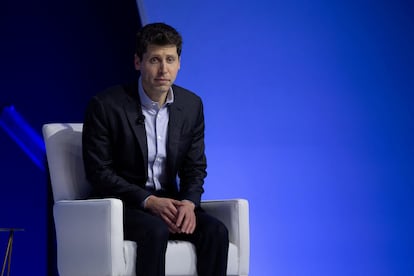Your next CEO will be a robot
People are asking, ‘What if we replaced managers with artificial intelligence?’

OpenAI, the company behind ChatGPT, missed a significant opportunity when it decided to part ways with its CEO, Sam Altman. As my colleague Marta Peirano recently explained, the dismissal came about due to a clash between the conservative faction in the company and Altman’s vision of speeding up progress towards general artificial intelligence (AI). This move seems to follow the typical path of technology firms: first disrupt, then deal with consequences like layoffs, polarization, fake news and the rise of populism.
I found another scenario floated on X quite amusing — a theory that Sam Altman had been replaced by artificial intelligence. It’s a fascinating concept indeed — a GPCEO: Generative Pre-trained Chief Executive Officer. And it’s not as far-fetched as it might seem. For years, we’ve been bombarded by notions that AI will ultimately replace humans due to its cost-effectiveness. So, why not start the experiment with technology enthusiasts like Altman, and in companies solely dedicated to artificial intelligence like OpenAI?
One can easily argue that the jobs most susceptible to displacement by AI are not those involving manual labor or creative thinking. Surprisingly, it’s the managers and directors who are most easily replaceable, and not just in technology companies. A frequently shared screenshot from a 2021 article in The New Statesman poses the question: “CEOs are hugely expensive. Why not automate them?” In his thought-provoking piece, Will Dunn contemplates the potential benefits of entrusting decision-making to algorithms, emphasizing the advantages of cost-effectiveness, safety and efficiency. Dunn cites Google and IBM, where these practices have already been partially implemented.
Now we're talking pic.twitter.com/f6B93gGpLa
— Dripped Out Trade Unionists (@UnionDrip) November 12, 2023
In 2020, Forbes published an article by Terry Walby that discussed the role of AI in relation to executives. It argued that AI can be used to enhance the capabilities of leaders, rather than replace them. Walby said CEOs should exercise caution and not overly rely on this technology. That’s the same advice we all get – not to follow our leaders blindly, as one day the dreaded pink slips may unexpectedly arrive.
Journalist Ed Zitron published another widely shared article in Business Insider that strongly criticized CEOs who strive to be “idea men,” like Elon Musk and Steve Jobs. It’s particularly concerning because they often don’t face the consequences when their big ideas lead to disastrous outcomes, as former Twitter employees can attest. Zitron believes CEOs have “the most expensive and easily automated role.”
In reality, many workers are already under the influence of algorithms and artificial intelligence. This includes people who are paid meager wages to correct the data that feed these systems, delivery drivers and everyone who dutifully follows GPS instructions. How about the social media influencers constantly striving to amplify their voices by optimizing the enigmatic rules of their favorite platforms?
William Morris said it many, many years go in his 1883 essay, Art under plutocracy. “The phrase ‘labor-saving machinery’ is elliptical, and means machinery which saves the cost of labor, not the labor itself, which will be expended when saved on tending other machines.” Since the advent of the Industrial Revolution, work has evolved from operating mechanical looms to interacting with computers and mobile phones. Now, algorithms pose a threat to our jobs, or perhaps even worse, they have the potential to become our bosses. However, we mustn’t forget that none of this is inevitable. We have the power to regulate technology and make deliberate choices about how it’s used, without relying on people like Sam Altman to make those decisions for us.
Sign up for our weekly newsletter to get more English-language news coverage from EL PAÍS USA Edition
Tu suscripción se está usando en otro dispositivo
¿Quieres añadir otro usuario a tu suscripción?
Si continúas leyendo en este dispositivo, no se podrá leer en el otro.
FlechaTu suscripción se está usando en otro dispositivo y solo puedes acceder a EL PAÍS desde un dispositivo a la vez.
Si quieres compartir tu cuenta, cambia tu suscripción a la modalidad Premium, así podrás añadir otro usuario. Cada uno accederá con su propia cuenta de email, lo que os permitirá personalizar vuestra experiencia en EL PAÍS.
¿Tienes una suscripción de empresa? Accede aquí para contratar más cuentas.
En el caso de no saber quién está usando tu cuenta, te recomendamos cambiar tu contraseña aquí.
Si decides continuar compartiendo tu cuenta, este mensaje se mostrará en tu dispositivo y en el de la otra persona que está usando tu cuenta de forma indefinida, afectando a tu experiencia de lectura. Puedes consultar aquí los términos y condiciones de la suscripción digital.









































